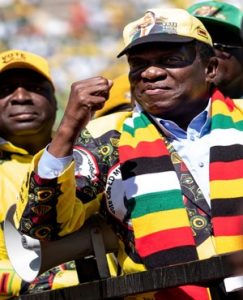
Emmerson Mnangagwa
Zimbabwe’s foreign and domestic debt will in 2018 rise to $14 billion, according to its Treasury. That is over 70 percent of GDP, up from 39 percent in 2013. And the country was one of six African nations that the International Monetary Fund judged to be in debt distress at the end of last year. Its big mistake was to adopt the U.S. dollar as its currency in 2009 in response to hyperinflation. With neither the foreign exchange reserves nor the government fiscal discipline to back it up, the policy became a rod for Harare’s back.
A three-step process could help. First, devalue the currency by 50 percent or more to restore export competitiveness. Second, convince global public-sector creditors, such as the World Bank, which hold over $7 billion of the $9.3 billion of Zimbabwean external debt to allow loans to be repaid over decades, rather than years. Finally, slash the public wage bill, which is equivalent to 20 percent of GDP.
Achieving all this will be near-impossible. A devaluation and wage cuts would stoke the unrest that broke out during the election, whose result is being questioned by the opposition. And institutions like the International Monetary Fund will only lend more money if the government has a credible fiscal plan and devises a plan to repay billions of dollars in arrears on past loans. If Mnangagwa can sort out even some of Zimbabwe’s problems, he will have done a good job.


